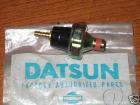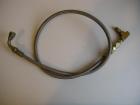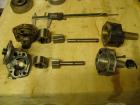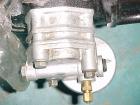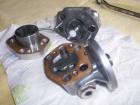| Revision as of 08:21, 16 April 2014 ddgonzal (Talk | contribs) <- Previous diff |
Revision as of 09:03, 16 April 2014 ddgonzal (Talk | contribs) (->Hybrid High Volume Pump) Next diff -> |
||
| Line 144: | Line 144: | ||
| If your engine is worked hard at high temperatures which results in a measured rise in oil temps, then use an oil cooler to fix the problem. That is much better than simply increasing pressure or volume to compensate. | If your engine is worked hard at high temperatures which results in a measured rise in oil temps, then use an oil cooler to fix the problem. That is much better than simply increasing pressure or volume to compensate. | ||
| + | |||
| + | = Is High Volume Needed? = | ||
| + | Increased pump volume will cut the time it take for oil pressure to come up at start up, especially when using oil coolers that drain back to the sump when the engine is switched off. | ||
| + | |||
| + | Also useful when fitting accessories to an engine which effectively create a leak in the pressure side of the oil system (Example: a turbo - especially the foating bearing type). These will bring the standard pump closer to the point of not being able to maintain good oil presure. | ||
| + | |||
| + | A small volume reserve is good insurance angainsed increased bearing clearances as the engine wears and if a leek occurs (maybe an oil cooler line) oil pressure to the engine bearings is more likely to be maintained (hopefully you realise there is a problem before the sump empties!) Some have reported that the Datsun Competition two stage pump on turbo engine only just has enough presure when the oil is hot and at idle (10 PSI) and that is with a ball bearing turbo that needs a lot less oil than a floating bearing type. But in general the reserve capacity of the standard A series pump has enough capacity to maintain good oil pressure with a turbo and hot oil. | ||
| + | |||
| + | Also, performance motors are generally built with clearances purposely on the large side, thus more leakage of oil when operating and the risk of dropping pressure. Unused capacity from a high volume pump is just returned to the sump via the pressure relief valve. There is extra capacity should you ever need it, but the downside is the extra power required to drive it due to higher pumping losses and thus the load on the cam/engine. | ||
| + | |||
| + | Baffled sump is to help keep the oil in the bottom of the sump even with high G-forces of racing. So a high volume pump is not needed for that. | ||
| [[Category:Engine Lubrication System]] | [[Category:Engine Lubrication System]] | ||
Revision as of 09:03, 16 April 2014
The Datsun 1200's A12 engine uses a standard type oil pump. The oil should be changed every 3,000 to 5,000 miles.
Contents |
Overview
Also see: Oil pressure indicator lamp: Wiring
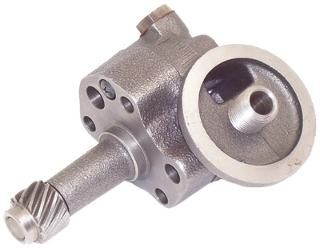
Oil Temperature
Also See: Oil Pump Coolers
The oil temperature is controlled by the engine coolant temperature. As long as the engine coolant ("water") does not overheat, neither will the oil. Only a very few high performance cars have a separate oil cooler. So this means:
keep your coolant temp low, and your oil temp will be happy.
Count on the oil temp to be about 20 F degrees hotter. So here is a good street performance equation:
- Thermostat: 180 F degrees
- Oil temp will run about 200 F degrees
At this temperature, the good quality regular oil (inexpensive) will perform as good as the expensive synthetics in a street car. It is high temps that ruin regular oil whereas the synthetic oil can take high temps OK.
Now if you are racing or towing there is more to talk about.
Engine oil capacity
- Oil pan: 2-7/8 U.S. qts., 2-3/8 Imper. qts. (2.7 L)
- Oil filter: 1-1/8 U.S. pints, 1 Imper. pint. (0.54 L)
Oil Pressure Sender
Nissan part number 25240-89910 SWITCH ASSY-OIL PRESSURE $17 USD See Switch Part Numbers
From the 1973 factory service manual:
- Oil pressure at idle (650 RPM ): 13-17 psi
- Regulator valve spring
- Free Length: 43.49 mm (1.71 inch)
- Pressured Length: 30.3 mm (1.19 inch)
- Regulator opening pressure: 54-60 psi
Thread Size - NPT: 1/8" x 28 British Std. Pipe (BSPT Tapered) Terminal Type: Bullet, Male Operating Pressure - PSI: 3 - 9 psi
Interchange
The stock Datsun 1200 oil pressure switch fits A-series and some L-series, Z-series, E-series, Diesel and CA-series engines. Also fits certain GM, IHC and Isuzu engines.
Datsun 1200 sender uses bullet connector.
Buy at RockAuto.com

NOTE: Some other Datsun senders use a spade connector or a screw connector
Nissan 25240-89902, 25240-89910 GM 94118755, 94312940 IHC 478097-C1 Isuzu 8-94118-755-0, 8-94312-940-0
For Pressure Gauge
Other Datsuns came with a pressure gauge, and used this switch:
Buy at RockAuto.com
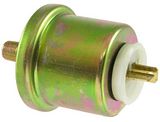
Datsun 720 Pickup
Thread Size 1/8-28 ISO Tapered Thread Switch to close at 3-10 PSI 0-2 PSI - 75 Ohms min 5.5 PSI - 44-60 Ohms 30 PSI - 27-41 Ohms 80 PSI - 7-20 Ohms
Oil Pressure Gauge
The oil pressure switch threads is 1/8 BSPT (british standard pipe tapered). It screws directly into the oil pump housing.
If you instead thread a Tee connector, you can fit both the sensor and a separate gauage. Tees are avaialable in the usual auto supply stores such as Repco or Oreillys.
Tee fitted to oil pump [Old Method, no longer recommended]
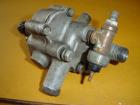

Right: this engine has the Tee (and an oil cooler)
A word of caution with this: they tend to break, perhaps due the weight of the sender at the end of the tee piece and the vibration of the engine. The solution is to use a braided hose from the oil sender hole out to the bodywork, and then mounted the tee with senders in place.
Datsun Nationals 2005 .. I think 3 different cars had their brass t-piece fail resulting in oil all over wakefield track. Definitely mount the brass fitting on the bodywork, not the engine. dattodude
Oil Usage
It is normal to add some oil between the oil changes. Usually a quart every 1,500 miles is OK. A quart every 500 miles indicates either a serious leak, or "oil burning" (bad rings) in the egine.
Oil Specifications
Interchangeability
All A-series oil pumps are interchangeable except early A10 models. New pumps work with early A10 connection rods.
- connecting rod cap strengthened with 1mm longer bolt boss starting with A10-728641
- Therfore, Oil pump driveshaft decreased 1.5 mm to clear the new cap design
Part Numbers
Also see: Oil Filter
USA
B110 RAW LIST 15010-H9701 ASSY-PUMP OIL WITH OUT OIL FILTER 15010-H6200 ASSY-PUMP OIL WITH OUT OIL FILTER 15010-H1000 ASSY-PUMP OIL WITH OUT OIL FILTER 15020-H1025 ASSY-SHAFT DRIVE OIL PUMP 15020-H1005 ASSY-SHAFT DRIVE OIL PUMP 15025-18003 GASKET-OIL PUMP 15132-H1000 ASSY-VALVE OIL REGULATOR 08310-53010 SET-BOLT BODY TO COVER 08915-13510 WASHER-SPRING 15066-18000 GASKET-OIL PUMP TO CYLINDER BLOCK 08915-13810 WASHER-LOCK 15036-18000 BOLT-OIL PUMP 08110-85510 BOLT 15050-H1000 ASSY-STRAINER OIL 15053-18000 GASKET-OIL STRAINER 08110-82010 BOLT 08915-13810 WASHER-LOCK
Nissan Competition Parts
See main article: Competition Oil Pump
Hybrid High Volume Pump
Use the L-series engine oil pump rotor and stator, which is exactly the same as A-series parts, but longer. This requires a spacer to make up the difference. It also requires modifying the shaft. Use the larger diameter L-series shaft pressed through the rotor and re-pin it for the A-series gear. Run a 1/2" reamer through the A series housing to make the L-shaft fit.
The stock pump works up to 10,000 RPM, so this is not needed for high RPM use.
But if you run loose tolerances in a race engine, or you run a cross drilled crank with full circle grooved main bearings, then extra volume may well be just what you need. Also modding the rocker shaft for increased oiling requires more volume.
High-volume is more important than high-pressure because it ensures oiling. The NISMO pump uses high-pressure (100psi) which will also work up to a point, and is far simpler, only requiring shims on the pressure valve. But the better, more expensive option -- if needed -- is the high-volume pump. Most built A-series engines do not need either high-pressure nor high-volume pumps.
If your engine is worked hard at high temperatures which results in a measured rise in oil temps, then use an oil cooler to fix the problem. That is much better than simply increasing pressure or volume to compensate.
Is High Volume Needed?
Increased pump volume will cut the time it take for oil pressure to come up at start up, especially when using oil coolers that drain back to the sump when the engine is switched off.
Also useful when fitting accessories to an engine which effectively create a leak in the pressure side of the oil system (Example: a turbo - especially the foating bearing type). These will bring the standard pump closer to the point of not being able to maintain good oil presure.
A small volume reserve is good insurance angainsed increased bearing clearances as the engine wears and if a leek occurs (maybe an oil cooler line) oil pressure to the engine bearings is more likely to be maintained (hopefully you realise there is a problem before the sump empties!) Some have reported that the Datsun Competition two stage pump on turbo engine only just has enough presure when the oil is hot and at idle (10 PSI) and that is with a ball bearing turbo that needs a lot less oil than a floating bearing type. But in general the reserve capacity of the standard A series pump has enough capacity to maintain good oil pressure with a turbo and hot oil.
Also, performance motors are generally built with clearances purposely on the large side, thus more leakage of oil when operating and the risk of dropping pressure. Unused capacity from a high volume pump is just returned to the sump via the pressure relief valve. There is extra capacity should you ever need it, but the downside is the extra power required to drive it due to higher pumping losses and thus the load on the cam/engine.
Baffled sump is to help keep the oil in the bottom of the sump even with high G-forces of racing. So a high volume pump is not needed for that.

![[Datsun 1200 encyclopedia]](/wiki/upload/wiki.png)
